Tomorrow: Unsavory Truth is out
Tomorrow is the official publication date for Unsavory Truth. Here’s the launch invitation.
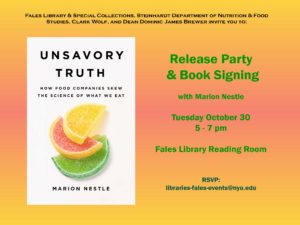
For information about the book, click here.
For my other public speaking engagements about the book, click here.
Enjoy!
Tomorrow is the official publication date for Unsavory Truth. Here’s the launch invitation.

For information about the book, click here.
For my other public speaking engagements about the book, click here.
Enjoy!
I just got an advance copy of my new book about food company sponsorship of nutrition research and its effects on public health—to be published next week on October 30.
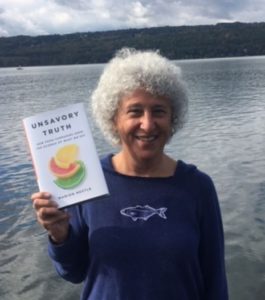
To get a taste (sorry) of the book, here are the first two pages of chapter 4. If you would like to read the Sugar Association’s letter to me and my reply, I’ve included links to them after this excerpt.
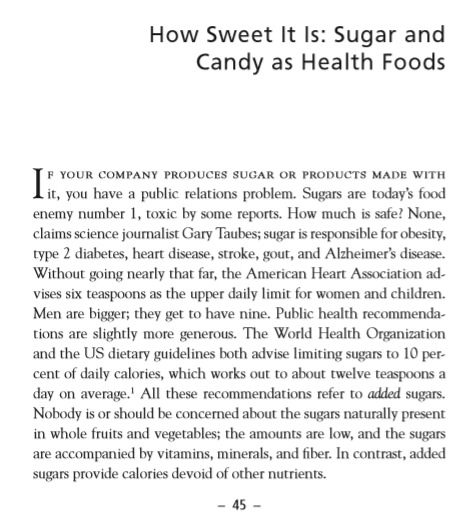
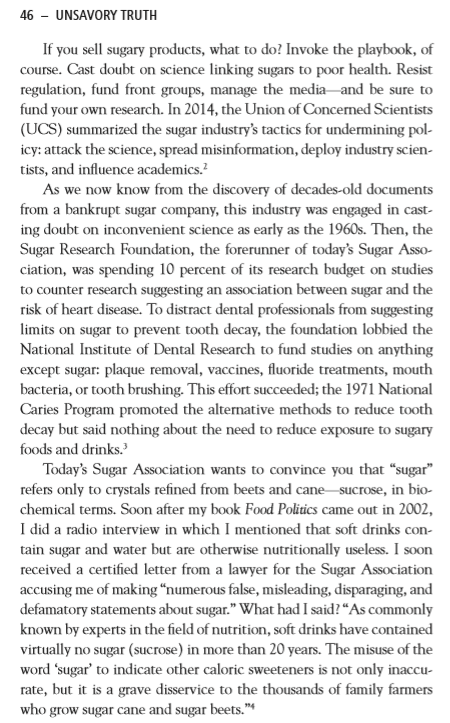
Want to read the rest of the letter and my reply?
Coming October 30: My new book about food company sponsorship of nutrition research and its effects on public health.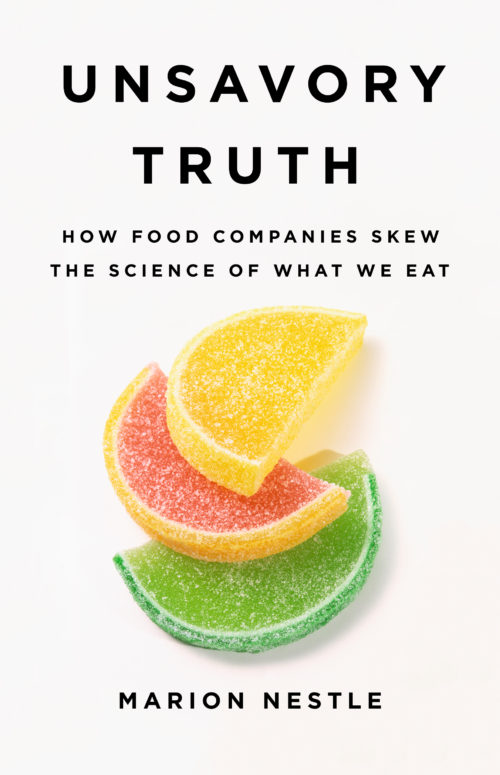
Here’s what page 2 has to say:
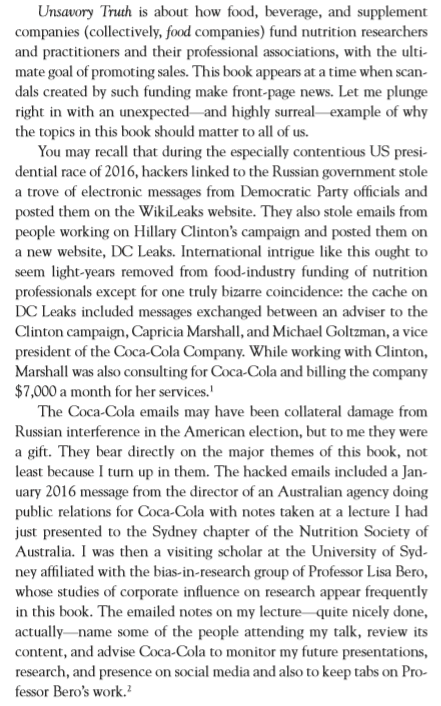
Coming October 30: My new book about food company sponsorship of nutrition research and its effects on public health.
And here’s what’s in it:
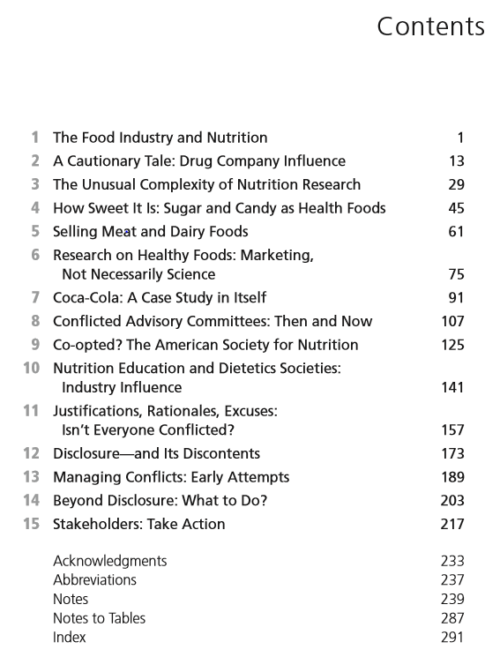
Coming October 30: My new book about food company sponsorship of nutrition research and its effects on public health.
The Kirkus review (August 1)
A leading nutritionist asks whether consumers can trust highly publicized research into whether food and beverages are healthy and safely produced.
Nestle (Emerita, Nutrition, Food Studies, and Public Health/New York Univ.; Big Soda Politics: Taking on Big Soda (and Winning), 2015, etc.), who has a doctorate in molecular biology and a master’s degree in public health nutrition and has conducted decades of research into food producers, is perfectly positioned for this topic. She makes the convincing case that because so much of the research is paid for by industries that benefit from the results, buyers should interpret the results skeptically. Many of Nestle’s previous books, articles, and academic studies focused on specific types of food. Here, the author turns her attention to large corporations, investigating why they pay for supposedly independent researchers, why the quality of the research might be compromised by conflicts of interests, how consumers can separate reliable science from compromised science, and why consumers should lobby legislators, government regulatory agencies, and universities for reforms regarding the disclosure of conflicts. Nestle emphasizes research paid for and disseminated by the sugar/candy industry, producers of dairy foods, marketers of meat, and—in its own chapter, “A Case Study in Itself”—the soda giant Coca-Cola. Since the author is a prolific nutrition researcher who has accepted funding that could involve conflicts of interest, she admirably scrutinizes her own policies of funding and how she discloses it. Ultimately, researchers must act as ethicists as well as scientists. When her own studies and those of fellow researchers become marketing tools for multinational conglomerates, the author admits that she feels queasy about how consumers might be misled by the marketing. On the other hand, she writes, some studies paid for by industry can be trusted scientifically—and be marketed and advertised responsibly.
Nestle proves yet again that she is a unique, valuable voice for engaged food consumers.
Other early reviews & interviews based on the bound galley proofs
Sept 25 La Stampa (Italy): “I cibi di lunga vita sono illusori e troppi sponsor li promuovono.”
Sept 24 Publishers Weekly: ” a groundbreaking look at how food corporations influence nutrition research and public
policy.”
Aug 13 Booklist review: “This well-documented, accessible venture makes a compelling argument.”
Aug 1 Kirkus review: “Nestle proves yet again that she is a unique, valuable voice for engaged food consumers.”
July 17 Phil Lempert’s Lempert Report: Get ready for a new era of transparency (video)
July 9 David Wineberg, “Nutrition: conflict of interest as a career,” Medium.com.
Feb 12 Finnish Public Radio interview about Unsavory Truth (Google Translate, English)
Jan 31 Profile in New Scientist: The Unpalatable Truth about Your Favorite foods
Coming October 30: My new book about food company sponsorship of nutrition research and its effects on public health.
Here is what some early readers had to say about it:
“What happens when one of the country’s great nutrition investigators follows the money in food and science? You get this riveting, provocatively-written book, which deftly explores how the processed food industry has deepened our dependence on its products by sponsoring and manipulating food research for decades. This book should be read by anyone who has been seduced by the words, ‘New study shows…’—which is all of us.” —Michael Moss, author of Salt Sugar Fat
“Marion Nestle is a tireless warrior for public health, and her meticulous research and irrefutable arguments are desperately needed right now. This book, as frightening as it is, compels us to discover where true health begins: nutrition starts in the ground, with real food that is sustainably grown, eaten in season, and alive.” —Alice Waters, founder, owner, and executive chef of Chez Panisse
“In clear, concise language, Marion Nestle details the many ways our ideas about what to eat are being manipulated by Big Food. If you want to make better choices, read this book.” —Ruth Reichl, former editor of Gourmet Magazine
“Marion Nestle is a national treasure. She has the courage to take on multinational corporations and the wisdom to separate the facts from the spin. If you care about our food system and the health of your family, Unsavory Truth is essential reading.” —Eric Schlosser, author of Fast Food Nation
“Marion Nestle has been a guiding light for sanity, credibility, and justice in food and nutrition for decades; she stands alone in her field. In Unsavory Truth, she exposes the awful deceptions practiced on eaters by manipulative food companies using ‘scientific research’ try to make themselves look good.” —Mark Bittman, author of How to Cook Everything
“Marion Nestle is a truth-teller in a world awash with nutrition lies of one kind and another. In this scintillating and eye-opening book, Nestle reveals how much of our confusion about food in modern times has been spread by the food industry itself, which passes off marketing as science and funds ‘research’ designed to show that its products are harmless. Unsavory Truth is essential reading for anyone in search of hard facts about what to eat.” —Bee Wilson, author of First Bite and Consider the Fork